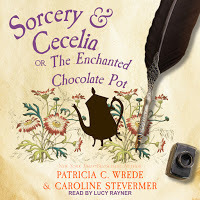Patricia C. Wrede's Blog, page 16
December 2, 2020
Showing up
First a couple of announcements and links.
This is the last week to apply for the Odyssey Workshop class on worldbuilding that I will be teaching in January. The sign-up page is at https://odysseyworkshop.org/worldbuilding.html; there are also some posts at https://www.facebook.com/OdysseyWorkshop, https://twitter.com/OdysseyWorkshop, and https://www.instagram.com/odysseyworkshop/.
And I had a lovely long interview with Edward Willett at the Worldshapers Podcast, which is now live at https://the...
November 25, 2020
Happy Thanksgiving!
Happy Thanksgiving to everyone! By an interesting coincidence, this is also Open Mic week; feel free to chat.
November 18, 2020
Scenes, advice, and complexity
“Every scene must cause or lead into the next scene.”
I ran across this particular bit of writing advice recently; it was followed by a couple of tips such as “cut any scene that isn’t caused by the scene immediately before it.”
Wow, that means Ian M. Banks should have cut every other chapter out of Use of Weapons. Which, unsurprisingly, means losing half the story.
Nonlinear fiction is kind of an obvious exception (although the perpetrator of this particular bit of writing advice didn’t allow f...
November 11, 2020
Rules, er, Guidelines of Writing
“There are three rules for writing a novel. Unfortunately, no one knows what they are.” ― W. Somerset Maugham
I love that quote. I think of it whenever I’m faced with a would-be writer or critic who is waving a copy of Strunk and White’s The Elements of Style around as if they expect several large thugs to appear from nowhere and break people’s legs for violating its principles. E. M. Forster’s Aspects of the Novel and John Gardner’s On Moral Fiction inspire similar reverence (and a similar resp...
November 4, 2020
Driven vs. Reluctant Heroes
There’s an adage about plot, probably originating in something John Gardner once said, to the effect that there are only two plots: either someone leaves on a journey, or a stranger comes to town.
I think the more useful way of looking at this part of the plot question is: either the protagonist goes looking for trouble, or trouble comes looking for the protagonist.
“Looking for trouble” is not as literal as it sounds at first hearing. To me, it sums up the active protagonist, the one who sets o...
October 28, 2020
Building the world
First, a couple of announcements. The audiobook of Sorcery and Cecelia is now available. Audiobooks for The Grand Tour and The Mislaid Magician will be coming in January; The Grand Tour is currently available for preorders.
The second announcement is that in January I will be teaching a class on worldbuilding for the Odyssey Online workshop. See https://odysseyworkshop.org/worldbuilding.html for further details. Because of this, worldbuilding is at the top of my mind at the moment, so that’s wha...
October 21, 2020
Pinball Wizard
Ultimately, plots are driven by the characters. Even when the main character is shipwrecked on a desert island and supposedly forced by this outside circumstance to struggle against nature, the character could simply give up and starve to death. Most writers don’t choose characters who would do that, of course.
But even the character who’s been shipwrecked starts the story with a plan. They were on that ship that got wrecked because they were going somewhere, and they expected to do something (g...
September 16, 2020
A Different look at Viewpoint
One of the most interesting things, to me, about reading old (like, 1930s or earlier) how-to-write books is the way they look at viewpoint. Modern writing texts focus mainly on who the viewpoint character is, or on the type of viewpoint (first, second, or third-person) and how that affects what the writer can and can’t do.
Older texts have a different – and, I think, instructive – perspective. They’re less concerned with “who” and “how” and more concerned with the angle from which readers get st...
September 9, 2020
Retroactive Outlining
I’m still working on revisions, and one of the first things I did was to make what I think of as the real outline of the story. I haven’t seen much, if any, discussion of this technique, so I thought I’d talk about how I do it and why.
I start by summarizing what I’ve actually written, chapter by chapter and scene by scene. And when I say “summarize,” I mean that I keep it as short as possible. I include the location, timing, the main characters, the one or two significant plot events … and anyt...
September 2, 2020
Open mic and announcement
So this is another open mic week – chat, make announcements, complain about your writing, whatever.
I’ll start:
Finally, after 32+ years, we are getting an audiobook for Sorcery and Cecelia! Release date is October 20, from audible




